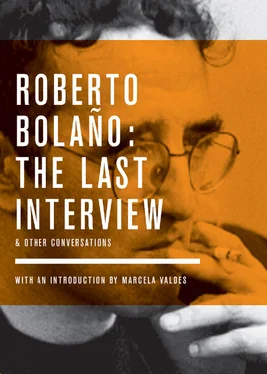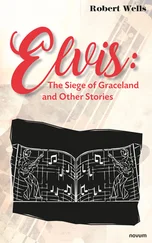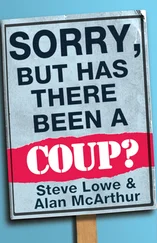MM:Would you not cut a few pages out of The Savage Detectives?
RB:No. In order to cut pages, I would have to reread it and my religion prohibits me that.
MM:Does it scare you that someone might want to make a film version of the novel?
RB:Oh, Mónica, I fear other things — much more terrifying things, infinitely more terrifying.
MM:Is “Silva the Eye” a tribute to Julio Cortázar?
RB:In no way.
MM:When you finished writing “Silva the Eye,” didn’t you feel you had probably written a story on the level of, say, “A House Taken Over”?
RB:When I finished writing “Silva the Eye” I stopped crying or something like it. What more could I want than for it to resemble a Cortázar story? Although “A House Taken Over” is not one of my favorites.
MM:Which five books have marked your life?
RB:In reality the five books are more like 5,000. I’ll mention these only as the tip of the spear: Don Quixote by Cervantes, Moby-Dick by Melville. The complete works of Borges, Hopscotch by Cortázar, A Confederacy of Dunces by Toole. I should also cite Nadja by Breton, the letters of Jacques Vaché. Anything Ubu by Jarry, Life: A User’s Manual by Perec. The Castle and The Trial by Kafka. Aphorisms by Lichtenberg. The Tractatus by Wittgenstein. The Invention of Morel by Bioy Casares. The Satyricon by Petronius. The History of Rome by Tito Livio. Pensées by Pascal.
A French surrealist writer, Jacques Vaché (1895–1919) worked closely with André Breton in the foundation of surrealism. A collection of his works, Jacques Vaché and the Roots of Surrealism , is available in English.
Georg Christoph Lichtenberg (1742–1799) was a German scientist and satirist. A collection of his aphorisms is available in English as The Waste Books , 2000.
MM:Do you get on well with your editor?
RB:Very well. Herralde is a very intelligent person and very often quite charming. Perhaps for me it would be more convenient if he weren’t so charming. The truth is I’ve known him for eight years now and, at least for my part, the affection does nothing if not grow, as one bolero puts it. Even though it might perhaps be better for me if I didn’t care for him so.
MM:What do you say to those who believe The Savage Detectives is the great contemporary Mexican novel?
RB:That they say it out of pity. They see that I’m down or fainting in public plazas and they can think of nothing better to say than a merciful lie, which, by the way, is the most appropriate thing in these cases, and it’s not even a venial sin.
MM:Is it true that it was Juan Villoro who convinced you not to name your novel By Night In Chile “Shit Storms”?
RB:It was between Villoro and Herralde.
MM:From whom else do you take advice about your work?
RB:I don’t listen to advice from anybody, not even my doctor. I wildly dole out advice, but I don’t heed any.
MM:How is Blanes?
RB:It’s a nice little town. Or a very small city of 30,000 inhabitants. Quite nice. It was founded 2,000 years ago by the Romans, then people from all over started passing through. It’s not a rich person’s resort but a proletariat’s. Workers from the north and the east. Some stay to live forever. The bay is most beautiful.
MM:Do you miss anything about your life in Mexico?
RB:My youth, and endless walks with Mario Santiago.
MM:Which Mexican writer do you admire profoundly?
RB:Many. From my generation I admire Sada, whose writing project I find the most bold, Villoro and Carmen Boullosa. Among the young writers, I am very interested in what Álvaro Enriqueand Mauricio Montielare doing, as well as Volpi and Ignacio Padilla. I continue to read Sergio Pitol, who writes better every day. And Carlos Monsiváis, who, according to Villoro, gave Taibo IIor III (or IV) the nickname Pol Pit, which seems to me a real poetic find. Pol Pit. It’s perfect, isn’t it? Monsiváis keeps his nails sharp. I also like what Sergio González Rodríguezis doing.
Mexican poet, novelist, playwright, and essayist Carmen Boullosa (b. 1954) was highly regarded by Bolaño. An essay he wrote about her, entitled “Biena y la sombra de una mujer,” appears in Entre parentesis , forthcoming in English from New Directions. She is also the co-host of a respected Spanish language television program, Nueva York .
Writer and editor Álvaro Enrigue (b. 1969) is a postmodernist Mexican writer. None of his major works have been translated into English, but a short story, “On the Author’s Death” is collected in the Best of Contemporary Mexican Fiction .
Mexican fiction writer, editor, and essayist Mauricio Montiel Figueroa (b. 1968) is one of the most lauded Mexican writers under forty. He has written several collections of short stories and a number of critical essays for various periodicals. See Points of Departure: New Stories from Mexico , 2001.
Along with Jorge Volpi and others, Mexican novelist and short story writer Ignacio Padilla (b. 1968) was a member of the “Crack Generation” that attempted to break the production of magical realism. Shadow Without a Name (2003), Antipodes (2004).
Mexican novelist and short story writer Sergio Pitol (b. 1933) was awarded the Cervantes Prize in 2005 for his work El mago de Viena (2005).
MM:Is the world without remedy?
RB:The world is alive and no living thing has any remedy. That’s our fortune.
MM:Do you have hope? For what and for whom?
RB:My dear Maristain, again you push me toward the land of bad taste, which is not my native land. I have hope for children. For children and warriors. For children who fuck like children and warriors who fight like brave men. Why? I defer to the headstone of Borges, as the illustrious Gervasio Montenegroof the Academy (like Pérez-Reverte, do take notice) would say, and let us not speak of this matter further.
MM:What kinds of feelings do posthumous works awaken in you?
RB:Posthumous: It sounds like the name of a Roman gladiator, an unconquered gladiator. At least that’s what poor Posthumous would like to believe. It gives him courage.
Mexican historian and cultural critic Carlos Monsiváis (b. 1938) is considered one of the foremost authorities on Mexican history and politics. See Mexican Postcards , 1997.
Mexican novelist Paco Ignacio Taibo II (b. 1949) is a best-selling author. His major works include the “Hector Balascoran Shayne” detective series, available in English, along with other works.
Mexican journalist Sergio Gonzáles Rodríguez (b. 1950) wrote Huesos en el desierto (2002), a penetrating look at the femicides plaguing Cuidad Juarez.
Gervasio Montenegro was a member of the Argentine Academy of Letters. It is also the name of a fictitious character created by Borges and Bioy Casares.
MM:What is your opinion about those who opine that you will win the Nobel Prize?
Читать дальше












